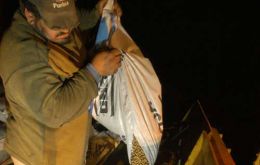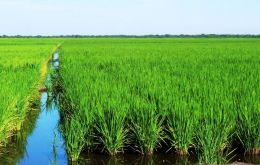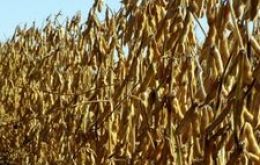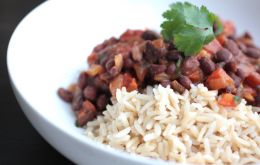MercoPress. South Atlantic News Agency
Tag: rice
-
Monday, September 29th 2014 - 09:09 UTC
Record soybean and wheat crops forecasted by the International Grains Council

The 2014-2015 season’s soybean and wheat crops are on track to set records, while rice and corn look poised to be more in line with last season’s record crops, according to the International Grains Council's September Grain Market Report.
-
Tuesday, November 26th 2013 - 08:41 UTC
Uruguay to benefit from agreement reached by Iran with world powers

The agreement reached by the world powers with Iran regarding its nuclear plans could have a positive impact for Uruguay, (and the region) since the regime of Teheran has been for years a strong client of Uruguayan rice and other products.
-
Friday, November 9th 2012 - 06:27 UTC
FAO October Price Index: cereals and oils down; increases in dairy and sugar

The FAO Food Price Index fell 1% in October 2012, and for the first ten months of the year food prices were on average 8% lower than in the same period in 2011. The Index dipped two points to 213 points from September's revised level of 215 points. The decline was largely due to lower international prices of cereals and oils and fats, which more than offset increases in dairy and sugar prices.
-
Friday, September 28th 2012 - 00:44 UTC
Soybean area keeps expanding in Uruguay; rice planters turning to the oilseed

Uruguayan farmers are planning to sow 1.105.000 hectares of crops this coming 2012/13 summer season, which is similar to last year’s of which 890.000 hectares or 80% will be dedicated to soybeans.
-
Tuesday, August 7th 2012 - 17:26 UTC
Rice supply outstrips demand despite lower 2012 production according to FAO

The United Nations’ food agency cut its 2012 global rice production forecast but said supply would still outstrip demand and that there was no increased risk of a food crisis as long as countries do not resort to export bans.
-
Tuesday, July 17th 2012 - 20:35 UTC
Uruguay’s 2011/12 rice harvest reaches 1.4 million tons with 7.850 kilos/ha yields

Uruguay’s area to be planted with rice in the coming 2012/13 season is estimated at 179.000 hectares, slightly down from the 181.400 of this year, according to the country’s Department of Agriculture Statistics (DIEA) and based on a poll following the 2011/12 harvest.
-
Wednesday, May 30th 2012 - 05:12 UTC
Merger in Brazil creates market leader in sugar, rice and canned fish

Brazilian sugar and ethanol producer Cosan and the country's largest rice producer, Camil Alimentos, reached an agreement to merge their food divisions, Cosan said in a statement this week.
-
Sunday, April 1st 2012 - 08:45 UTC
Sanctions on Iran force Uruguay to propose Teheran rice for oil barter deal

Uruguay will consult with Iran the possibility of exporting rice in exchange for oil, the government of President Jose Mujica said on Friday.
-
Friday, February 10th 2012 - 04:15 UTC
Brazil anticipates a 3% contraction in the 2011/12 crop because of severe drought

The 2012 Brazilian grains and oilseed is expected to be below the 2011 record because of the intense drought in the months of December and January, particularly to the south of the country where soybeans and rice suffered most reported the Geography and Statistics Institute, IBGE.
-
Tuesday, December 6th 2011 - 04:19 UTC
Vietnamese teaching Cubans how to grow rice efficiently

Cuba plans to enlarge to 40,000 hectares a Vietnamese-aided test farm to expand production of rice, official media said on Monday.
